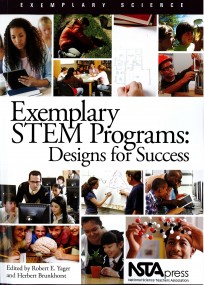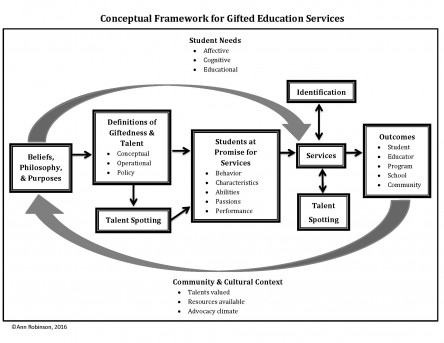Graphics
Journal Articles
Robinson, A. (under development). Harry and Euphemia: Social justice and the Passow Report on the Washington D.C. schools.
Deitz, C. (May 2019). All for 0ne: The art of collaboration. Teaching for High Potential. National Association for Gifted Children.
Robinson, A., Adelson, J.L., Kidd, K., & Cunningham, C.M. (2018). Talent for tinkering: Developing talents in children from low-income households through engineering curriculum? Teaching for High Potential.
Robinson, A., Adelson, J.L., Kidd, K., & Cunningham, C.M. (2018). Talent for tinkering: Developing talents in children from low-income households through engineering curriculum. Gifted Child Quarterly, 62(1).
Robinson, A., Adelson, J. L., Kidd, K. A., & Cunningham, C. M. (2018). A talent for tinkering: Developing talents in children from low-income households through engineering curriculum? Teaching for High Potential. 1, 14- 16.
Robinson, A., Adelson, J. L., Kidd, K. A., & Cunningham, C. M. (2018). A talent for tinkering: Developing talents in children from low-income households through engineering curriculum. Gifted Child Quarterly, 62(1), 130-144.
Dailey, D., & Robinson, A. (2017). Improving and sustaining elementary teachers’ science teaching perceptions and process skills: A post-intervention study. Journal of Science Teacher Education, 28(2), 169-185.
Deitz, M.C. & Robinson, A. (2017, June). A slice of Hamilton. Parenting for High Potential, 2-3.
Dailey, D., & Robinson, A. (2016). Elementary teachers: Concerns about implementing a science program. School Science and Mathematics, 116(3), 139-147.
Robinson, A., Dailey, D., Hughes, G., & Cotabish, A. (2014). The effects of a science-focused STEM intervention on gifted elementary students’ science knowledge and skills. Journal of Advanced Academics, 25(3), 189-213.
Cotabish, A., Dailey, D., Robinson, A., & Hughes, G. (2013). The effects of a STEM intervention on elementary students’ science knowledge and skills. School Science and Mathematics, 113(5), 215-226.
Robinson, A. (2012, Summer). STEM for all or all STEM for some: Is that REALLY the question? Invited response to the Forum, R.D. Atkinson’s “Why the current education reform strategy won’t work,” Issues in Science and Technology, Vol 28(4).
Cotabish, A., Dailey, D., Hughes, G. D., & Robinson, A. (2011). The Effects of a STEM Professional Development Intervention on Elementary Teachers’ Science Process Skills. Research in the Schools, 18(2), 16-25.
Books

Everybody talks about STEM initiatives, but is anybody doing them effectively? This book’s answer is a resounding yes! It tells the inside stories of 24 science, technology, engineering, and mathematics programs that both connect with the Next Generation Science Standards and lead to successful student learning.
Chapter 1: STEM Starters: An Effective Model for Elementary Teachers and Students
STEM Starters in funded by a five-year Research and Development Jacob K. Javits Grant from the U.S. Department of Education.
Book Chapters
Robinson, A., & Meadows, M (2020). Instructional strategies to support low-income learners: The STEM fields. In T. Stambaugh & Olszewski-Kubilius, P. (Eds.), Unlocking potential: Identifying and serving gifted students from low income households. Waco, TX; Prufrock.
Robinson, A. (2017). Conceptual frameworks in gifted education as the foundation for services. In J. Roberts, T. Inman, & J. Robins (Eds.), Introduction to gifted education. Waco, TX; Prufrock. pp 5-15.
Robinson, A. (2017). An eventful history of gifted education. In C.M. Callahan and H. Hertberg-Davis, Fundamentals of gifted education: Considering multiple perspectives, 2nd ed. London: Routledge. pp 22-31.
Robinson, A. (2017). Developing STEM talent in the early school years: STEM Starters and its Next Generation scale up. In K. S. Taber & M. Sumida (Eds.) Teaching Gifted Learners in STEM Subjects: Developing talent in science, technology, engineering and mathematics. London: Routledge. pp 21-30.
Robinson, A., Kidd, K., & Adelson J.L. (2017). Assessments for K-8 engineering: What is available and advisable for talented students? In D. Dailey & A. Cotabish (eds.) Engineering instruction for high-ability learners in K-8 classrooms. Waco, TX: Prufrock. pp 165-178.
Robinson, A., Kidd, K., & Deitz, M.C. (2016) Biography builds STEM understanding. In B. D. Macfarlane (Ed.) STEM education for high-ability learners: Designing and implementing programs. Waco, TX: Prufrock Press.
Robinson, A. & Tabler, A. (2016). A survey of curriculum models in gifted education: Frameworks for developing and implementing differentiated curricula. In F.A. Karnes & K. R. Stephens (Eds.) Introduction to curriculum design in gifted education. Waco, TX: Prufrock.
Robinson, A. & Kolloff, P.K. (2015). Preparing teachers to work with secondary gifted students. In F. Dixon & S. Moon. Secondary Gifted Education, 2nd edition. Waco, TX: Prufrock.
Robinson, A., Dailey, D., Cotabish, A., Hughes, G., & Hall, T. (2014). STEM Starters: An effective model for elementary teachers and students. In Robert E. Yager (Ed.), Exemplary Science Program Series, 10th ed. [Monograph: National Science Teachers Association]. Arlington, VA: NSTA Press.
Robinson, A. & Dailey, D. (forthcoming). Effective practices and the development of talent in schools and classrooms. In J.K. Bakken (Ed). Advances in special education: Gifted education. Emerald Publishers.
Robinson, A. (2014). Teacher characteristics. In C. M. Callahan & J. Plucker (Eds.), Critical issues and practices in gifted education, 2nd ed. Waco, TX: Prufrock.
Robinson, A. (2014). Biography, history, and pioneering ideas. In A. Robinson & J. Jolly (Eds.), A century of contributions to gifted education: Illuminating lives. (pp. 1-7). New York, NY: Routledge.
Robinson, A. (2014). Building practice, advocacy, and policy. In A. Robinson & J. Jolly (Eds.), A century of contributions to gifted education: Illuminating lives. (pp. 199-201). New York, NY: Routledge.
Robinson, A. & Jolly, J. (2014). Concluding thoughts on a century of contributions to gifted education. In A. Robinson & J. Jolly Eds.). A century of contributions to gifted education: Illuminating lives. (pp. 302-303). New York, NY: Routledge.
Presentations
Robinson, A., Adelson, J.A., Navarette, K.M., Kidd, K.A., Cash, K.M., & Cunningham, C.M. (2019, April). Engineering practices and talented young students: Investigating design under constraints. Paper to be presented at the Annual Meeting of the American Educational Research Association (AERA), Toronto, Canada.
Robinson, A., Adelson, J.A., Kidd, K.A., Cash, K.M., Navarette, K.M., & Cunningham, C.M. (2018, April). Effects of an engineering and science intervention on the science achievement of talented elementary students. Paper presented at the Annual Meeting of the American Educational Research Association (AERA), New York, NY.
Robinson, A., Adelson, J.A., Cash, K.M, Meadows, M., & Deitz, M.C. (2018, April). Spotting gaps: An engineering curriculum platform for advanced learners from culturally diverse and/or low-income households. Paper presented at the Annual Meeting of the American Educational Research Association (AERA), New York, NY.
Robinson, A., Adelson, J.A., Kidd, K.A., Moreno, K., Maher, A., Cash, K., & Cunningham, C. (2017, April). A talent for tinkering: Developing talents in low-income children through engineering curriculum. Paper presented at the Annual Meeting of the American Educational Research Association (AERA), San Antonio, TX.
Robinson, A., Kidd, K.A., Adelson, J.L., Deitz, M.C., & Meadows, M. (2017, April). Teacher perceptions of developing engineering talent in low-income young children through evidence-based curriculum. Paper presented at the Annual Meeting of the American Educational Research Association (AERA), San Antonio, TX.
Cash, K., Adelson, J. & Robinson, A. (2016, April). Development of the Science and Math Engagement Scale. Paper presented at the Annual Meeting of the American Educational Research Association (AERA), Washington, DC.
Deitz, M.C. & Robinson, A. (2016, April). Using biography and biographical methods in the classroom: Lives that teach. Paper presented at the Annual Meeting of the American Educational Research Association (AERA), Washington, DC.
Curriculum
Blueprints for Biography: Differentiating the Curriculum for Talented Readers
- A Blueprint for Biography is a guide for teachers and students engaged in the study of a specific biography.
- Available on Marian Anderson, Alexander Graham Bell, George Washington Carver, Marie Curie, Thomas Edison, Albert Einstein, Galileo Galilei, Mary Kingsley, Ada Lovelace, Louis Pasteur, John B. Stetson, Vincent Van Gogh, Walt Whitman, and Orville, Wilbur, and Katherine Wright.
STEM Education
STEM Starters + is funded by a five-year Research and Development Jacob K. Javits Grant from the U.S. Department of Education. Principal Investigator: Dr. Ann Robinson and Project Director: Kristy Kidd
Collaborating School Districts in Arkansas: El Dorado, Little Rock, and Pulaski County
